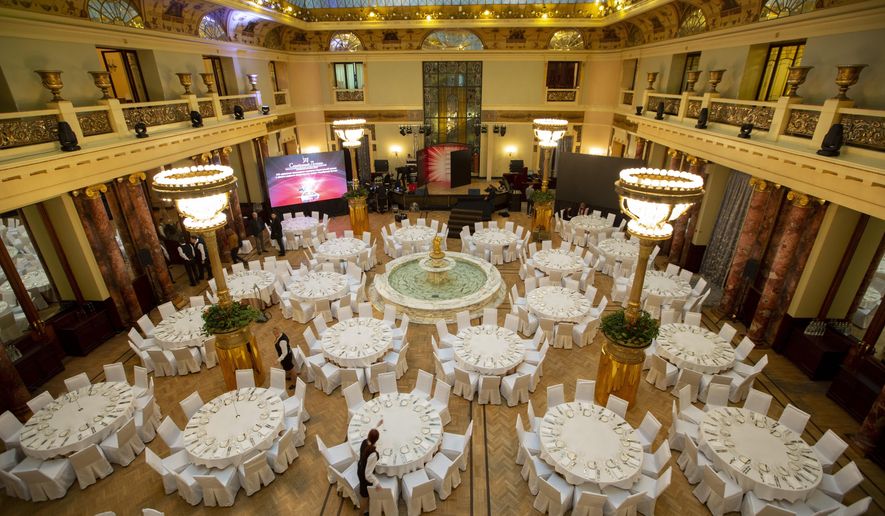MOSCOW (AP) - In 1991, as the Soviet Union collapsed around him, Alexander Mishakov was summoned to a place that was off-limits to most citizens - the Metropol Hotel.
Newly graduated from a technical institute, the 24-year-old had scored an interview for a breakfast chef position. Catching the first morning train into central Moscow, he walked through the hotel’s grand entrance and into a sphere of unimagined elegance. At the time, the hotel was open only to foreign guests and a privileged echelon of the Soviet elite.
“I will never forget my first impression walking into that magnificent dining hall,” said Mishakov, now the hotel’s head chef. “I had never seen anything like it.”
Today, anyone can walk in and be stunned by the restaurant’s Art Nouveau stained-glass dome, glittering chandeliers and marble fountain.
The Metropol, which opened in 1905, has borne witness to some of Moscow’s most dramatic chapters. It has seen glamour, revolution and espionage; gangsters and celebrities.
In its earliest days, Russia’s czarist elites swept through the Metropol’s gilded halls. Artists, ballerinas and intellectuals toasted the greatness of Imperial Russia under the crystal chandeliers. Fish swam in the fountain at the center of the great dining hall - and would then be served for supper. Rasputin held his infamous parties behind the hotel’s doors. And when Czar Nicholas II signed a manifesto promising liberal reforms, opera singer Fyodor Chaliapin got up on a table, sang folk songs and passed around his hat asking for contributions for workers.
When the Bolshevik Revolution swept across Russia, the hotel briefly became a barracks for the anti-Bolshevik White Army, then was captured and turned into Bolshevik headquarters. The dining tables and chandeliers were replaced by simple wooden benches and kerosene lamps.
Revolutionary leaders congregated in the now-darkened restaurant. Luxury suites were converted into committee meeting rooms. The once-polished floors became filthy with grit and tobacco. Vladimir Lenin, Leon Trotsky and other Bolshevik leaders regularly gave speeches there.
In the 1930s, the Politburo recognized the need to form stronger ties with the capitalist world. Foreign visitors were allowed in again, albeit under strict conditions. The Metropol was reopened as a hotel in 1931 and, as one of the best in Russia, became an important part of the state propaganda machine.
“The hotel was a window of clouded glass, through which visitors would see a highly propagandized version of what was happening in the country,” said the Metropol’s resident historian, Ekaterina Yegorova.
Foreign guests slept in plush, spacious rooms, ate well, and were told about the wonders of Soviet industry and agriculture. Visits were tightly controlled by the KGB; visitors were not allowed to move freely, and guides from the state travel agency Intourist were never permitted to go off-script. Any communication with foreigners was dangerous.
During this period, Communist sympathizers, writers and journalists flocked to the Metropol. Among them were playwright George Bernard Shaw, actress Marlene Dietrich and Chinese revolutionary Mao Tse-tung. While awaiting his papers for defection to the Soviet Union, Lee Harvey Oswald spent a few days there in 1959.
Yegorova’s “clouded window” was particularly evident in Shaw’s grand visit to Moscow. Stepping off the Warsaw-Moscow night express in July 1931, he was greeted by a military honor guard and crowds crying “Hail, Shaw!” He toured collective farms, met with Lenin’s widow, and was even received by Joseph Stalin for almost two hours.
“What I saw was most impressive and quite different from anything we see (in England). I saw nothing disagreeable in Moscow,” he later wrote.
The Welsh journalist Gareth Jones was also impressed, but more perceptive of Soviet shortcomings. “The Hotel Metropol is really a swell place, and quite typically there is a radio in every room, but no toilet paper anywhere,” he wrote.
As the Soviet Union, with its shortages and endless food queues, came crashing down, a rush of high-quality foreign foods and commercial goods flooded into the new Russia of the 1990s, and into the Metropol.
The hotel began receiving two huge truckloads of food twice a month: high-quality meats, yogurts, avocados, cheeses and exotic fruit.
“It opened up a whole new world of cooking,” said Mishakov.
The country shifted again.
“The world suddenly opened: People started to travel, they started to understand how life should be, what to strive for,” said Mishakov.
The hotel was no longer just for foreigners, but for Russians too - those who could afford it. The lobby soon became home to gangsters and the “New Russians,” who spent lavishly and terrified the hotel’s staff. They liked things big and excessive.
And the Metropol, across the street from the Bolshoi Theater and 500 meters from Red Square, also became a favorite with world leaders and celebrities, from Michael Jackson to Elton John, French President Jacques Chirac to the late North Korean leader Kim Jong Il. In 2009, U.S. President Barak Obama gave a speech there.
In 2016, the hotel’s renown grew even greater with the publication of Amor Towles’ best-selling novel “A Gentleman in Moscow,” set almost entirely inside the Metropol.
And last year, the hotel was in the spotlight again when American Paul Whelan was arrested there on spying charges.
“I like to say that this hotel is like a history textbook,” Yegorova said. “If the walls could remember, they would remember so much.”
Mishakov, for his part, likes to think of the Metropol as a ship: “She is vast and she rocks along the same currents as the country.”




Please read our comment policy before commenting.